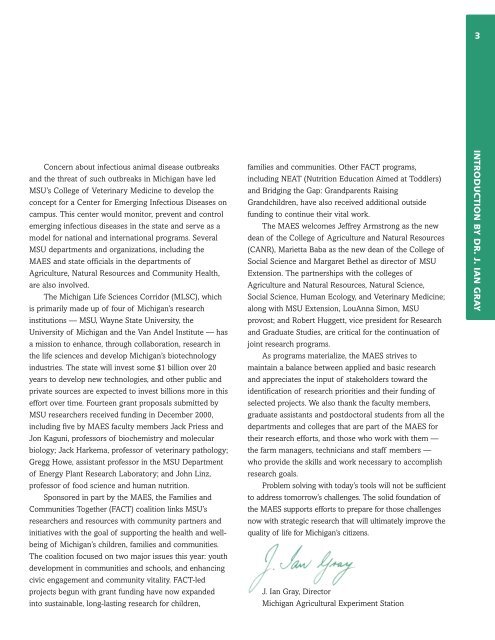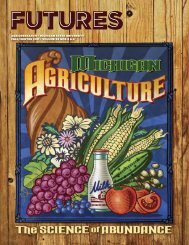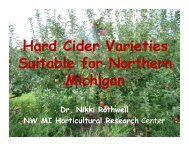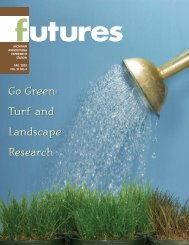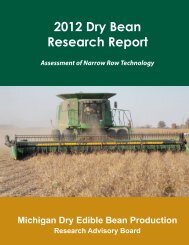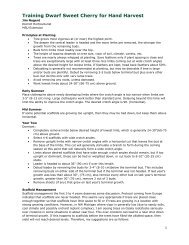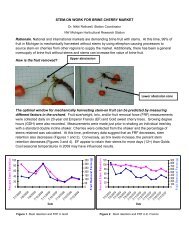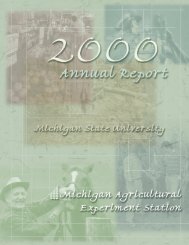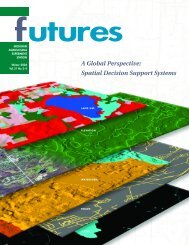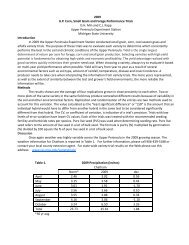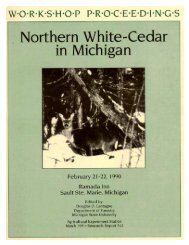01 ANNUAL REPORT - AgBioResearch - Michigan State University
01 ANNUAL REPORT - AgBioResearch - Michigan State University
01 ANNUAL REPORT - AgBioResearch - Michigan State University
You also want an ePaper? Increase the reach of your titles
YUMPU automatically turns print PDFs into web optimized ePapers that Google loves.
3<br />
Concern about infectious animal disease outbreaks<br />
and the threat of such outbreaks in <strong>Michigan</strong> have led<br />
MSU’s College of Veterinary Medicine to develop the<br />
concept for a Center for Emerging Infectious Diseases on<br />
campus. This center would monitor, prevent and control<br />
emerging infectious diseases in the state and serve as a<br />
model for national and international programs. Several<br />
MSU departments and organizations, including the<br />
MAES and state officials in the departments of<br />
Agriculture, Natural Resources and Community Health,<br />
are also involved.<br />
The <strong>Michigan</strong> Life Sciences Corridor (MLSC), which<br />
is primarily made up of four of <strong>Michigan</strong>’s research<br />
institutions — MSU, Wayne <strong>State</strong> <strong>University</strong>, the<br />
<strong>University</strong> of <strong>Michigan</strong> and the Van Andel Institute — has<br />
a mission to enhance, through collaboration, research in<br />
the life sciences and develop <strong>Michigan</strong>’s biotechnology<br />
industries. The state will invest some $1 billion over 20<br />
years to develop new technologies, and other public and<br />
private sources are expected to invest billions more in this<br />
effort over time. Fourteen grant proposals submitted by<br />
MSU researchers received funding in December 2000,<br />
including five by MAES faculty members Jack Priess and<br />
Jon Kaguni, professors of biochemistry and molecular<br />
biology; Jack Harkema, professor of veterinary pathology;<br />
Gregg Howe, assistant professor in the MSU Department<br />
of Energy Plant Research Laboratory; and John Linz,<br />
professor of food science and human nutrition.<br />
Sponsored in part by the MAES, the Families and<br />
Communities Together (FACT) coalition links MSU’s<br />
researchers and resources with community partners and<br />
initiatives with the goal of supporting the health and wellbeing<br />
of <strong>Michigan</strong>’s children, families and communities.<br />
The coalition focused on two major issues this year: youth<br />
development in communities and schools, and enhancing<br />
civic engagement and community vitality. FACT-led<br />
projects begun with grant funding have now expanded<br />
into sustainable, long-lasting research for children,<br />
families and communities. Other FACT programs,<br />
including NEAT (Nutrition Education Aimed at Toddlers)<br />
and Bridging the Gap: Grandparents Raising<br />
Grandchildren, have also received additional outside<br />
funding to continue their vital work.<br />
The MAES welcomes Jeffrey Armstrong as the new<br />
dean of the College of Agriculture and Natural Resources<br />
(CANR), Marietta Baba as the new dean of the College of<br />
Social Science and Margaret Bethel as director of MSU<br />
Extension. The partnerships with the colleges of<br />
Agriculture and Natural Resources, Natural Science,<br />
Social Science, Human Ecology, and Veterinary Medicine;<br />
along with MSU Extension, LouAnna Simon, MSU<br />
provost; and Robert Huggett, vice president for Research<br />
and Graduate Studies, are critical for the continuation of<br />
joint research programs.<br />
As programs materialize, the MAES strives to<br />
maintain a balance between applied and basic research<br />
and appreciates the input of stakeholders toward the<br />
identification of research priorities and their funding of<br />
selected projects. We also thank the faculty members,<br />
graduate assistants and postdoctoral students from all the<br />
departments and colleges that are part of the MAES for<br />
their research efforts, and those who work with them —<br />
the farm managers, technicians and staff members —<br />
who provide the skills and work necessary to accomplish<br />
research goals.<br />
Problem solving with today’s tools will not be sufficient<br />
to address tomorrow’s challenges. The solid foundation of<br />
the MAES supports efforts to prepare for those challenges<br />
now with strategic research that will ultimately improve the<br />
quality of life for <strong>Michigan</strong>’s citizens.<br />
J. Ian Gray, Director<br />
<strong>Michigan</strong> Agricultural Experiment Station<br />
INTRODUCTION BY DR. J. IAN GRAY


